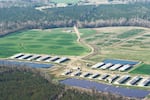Last year, with the support of a broad coalition of farm and environmental advocacy groups, Oregon. Gov Tina Kotek signed into law a bill that significantly reformed how large animal farms operate in Oregon. Now, that coalition is asking the governor to continue regulating an industry that, in its view, fuels climate change, causes water and air pollution and exploits workers.

Swine facility lagoons on banks of stream and waste transport ditches to stream in North Carolina, Feb. 22 2012.
Acquired / Waterkeeper Alliance Inc.
Stand Up to Factory Farms — a coalition made up of local, state and national organizations concerned about large-scale animal farms — sent a petition with around 1,500 signatures to the governor’s office Friday. The petition urges the governor to put a stop to new and expanding large confined animal feeding operations, or CAFOs. In Oregon that could mean banning a dairy farm with more than 2,500 cows or a poultry farm that raises 750,000 broiler chickens or more a year.
Environmental advocates and some farmers point to Lost Valley Farm near Boardman as the inspiration for state Senate Bill 85 — the law that added new requirements and definitions to Oregon’s CAFO permitting program. That farm was shut down summer of 2018 after it racked up more than 200 environmental citations and more than $187,000 in fines for violating its wastewater permit. At the time, the farm was the second-largest dairy farm in Oregon, with a permit for 30,000 cows. Lost Valley eventually filed for bankruptcy.
While Senate Bill 85 added some more oversight to the CAFO permitting process, Aimee Travis, an organizer in Oregon for Food and Water Watch — an environment watchdog group based in Washington D.C. — said there are still issues the group wants to see addressed.
“Moving into the next legislative session, we’re just trying to build momentum and mobilize Oregonians and just get our elected officials to actually fight for their constituents and not the large agribusiness corporations that kind of control the agricultural sector,” Travis said.
Amy van Saun, an attorney based in Oregon for the Center for Food Safety and a member of the Stand Up to Factory Farms coalition, said the group will lobby in the 2025 legislative session to address the decades-long nitrate pollution crisis in the Lower Umatilla Basin near Boardman.
Residents there have had to deal with polluted well water contaminated by manure fertilizer runoff from irrigated farms. If consumed in high levels, nitrate exposure has been linked to long-term health problems including cancer, according to the Oregon Health Authority.
Related: Oregon Gov. Tina Kotek lays out new nitrate goals amid criticism
Van Saun also said large CAFO facilities are a known source of methane, a potent greenhouse gas. Despite that, they said, Oregon does not regulate gas emissions from large farms the same way it regulates other gas-emitting industries — something the group will also look to change.
“Agriculture, in fact, is one of the least regulated of any industry because of what we call ‘agricultural exceptionalism’ — this idea that, because it has to do with food, therefore, we shouldn’t regulate, is a very traditional and romantic idea of what farming looks like,” van Saun said. “But what farming unfortunately really does look like these days is much more industrialized.”
Tami Kerr, the executive director of the Oregon Dairy Farmers Association, said she supports Oregon’s high environmental standards on animal farms, but she takes issue with the way large dairy farms are characterized.
“Frankly the term ‘factory farm’ is really offensive,” she said. “We’ve adopted and modified practices and requirements in the [CAFO] permit. And I think that this organization is using a lot of very misleading statements and comments and really scaring the public,” referring to Stand Up to Factory Farms.
Kerr said it’s premature to seek more requirements to the CAFO program before the new rules are in place.
“They’re finishing the rule-making, it’s just in the process of being implemented,” Kerr said. “So I respectfully would request time to see the program implemented before more regulations are passed.”
The public can comment on the proposed updates to Oregon’s CAFO program through July 22. The changes will be adopted later this summer.



